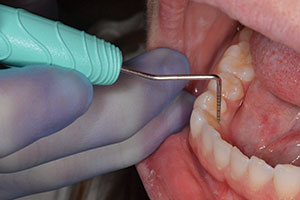What do you do when you have more patients than time in the schedule for them, you are adding new pa-tients because of a change in local demographics, or perhaps you are not ready to invest in a second hygienist? This article investigates a possible solution that, if implemented correctly and thoughtfully, will help boost your bottom line and keep the patients coming.
If you were to ask your hygienist how he or she could maximize production, I’m sure the answer would be, “Please consider hiring an assistant who could help me be more efficient!” For many offices, an assistant dedicated to helping the hygiene flow would increase total production of the hygienist and more than cover the additional salary expectations. In addition, a fully trained hygiene assistant can work with patients not only by explaining periodontal treatment, but also by answering questions about your treatment plans. However, as with any staff additions, there are many challenges on the way to success.  With this kind of staff addition the doctor needs to be willing to allow change, have an understanding of the financial impact of hygiene treatment on the bottom line, be capable of great communication with the whole staff, and possess the ability to set clear expectations and goals. It has been my experience that most doctors in private practice are not willing to let their hygienist know daily, weekly, monthly, and annual production and financial numbers. I have found that partnering with the hygienist in these areas increases mutual respect. In turn, it increases cross-referrals to the restorative side. Sharing information necessary to truly partner with your hygienist will allow an integrated clinical partnership. When the hygiene department knows its production goals and is willing not only to meet but also to exceed them on a consistent basis, it might be time to add a hygiene assistant.
With this kind of staff addition the doctor needs to be willing to allow change, have an understanding of the financial impact of hygiene treatment on the bottom line, be capable of great communication with the whole staff, and possess the ability to set clear expectations and goals. It has been my experience that most doctors in private practice are not willing to let their hygienist know daily, weekly, monthly, and annual production and financial numbers. I have found that partnering with the hygienist in these areas increases mutual respect. In turn, it increases cross-referrals to the restorative side. Sharing information necessary to truly partner with your hygienist will allow an integrated clinical partnership. When the hygiene department knows its production goals and is willing not only to meet but also to exceed them on a consistent basis, it might be time to add a hygiene assistant.
Once the decision has been made to hire a hygiene assistant, it is best to encourage your hygienist to be part of the interview process. Remember, this person will be responsible for increasing patient flow and overall hygiene production by encouraging patients to accept recommended treatment, taking impressions for whitening trays (saving the patient from a second and third trip to your office), taking vital signs, applying fluoride, taking routine digital or conventional radiographs, recementing temporaries, and speeding up the periodontal charting process. (It is advisable to check your state’s regulations regarding duties that can be delegated to a dental assistant.)
Finding and training a hygiene assistant can be a challenge. This position may be a good, entry-level introduction to dental assisting or for someone thinking of a career in dentistry. It could possibly be filled with a chairside dental assistant who wants a change from assisting the dentist. Other options are hygiene students who need to work their way through school; hygienists who have recently moved into an area and are waiting for licensure, board exams, etc; or expanded-function assistants who rotate between different positions within an office based on scheduling demands. In any of these instances, the hygiene assistant must be well-trained in the latest periodontal therapy and office protocols.
It is important that they establish a good working relationship. After hiring the assistant, the hygienist-assistant team should schedule meetings in addition to attending regular staff meetings. With hygiene assisting, respect for each other has to be established. The hygiene assistant must be empowered by the hygienist (and the doctor) to encourage optimal periodontal therapy. Boundaries will need to be set, and the assistant must be assured that his or her instructions and training (retraining) will be coming from the hygienist. The doctor’s willingness to be supportive is vital, while the ability to “stand back” is crucial. Most situations involving potential conflict can be handled by the hygienist with good communication skills if proactively addressed. The doctor can be the final arbitrator, but only when other solutions do not exist.
As for salary expectations, both the doctor and the hygienist need to agree upon how the assistant will be paid. Will compensation be based on hygiene production, total production, or perhaps base pay plus incentive pay for certain procedures (whitening, fluoride, radiographs, etc)? Will the hygienist’s salary be adjusted to compensate for the increased production as a result of utilizing an assistant? Will you change the daily compensation plan or raise production goals? It is important to have a clear and mutual understanding on these issues.
The situation may be different within a corporate practice, since salaries for you and the hygienist may have nothing to do with each other. Success in this type of practice comes from working together to reach a preset monthly practice goal or a relationship that may even be mutually independent. Goals and bonus arrangements may be set for one group (doctor/assistant/front desk) and be different, or absent, for the hygienist. If the hygienist is paid based on production, he or she will be working exclusively toward a base income. Any and all hygiene treatment will be contributory. There will be a reliance on keeping as much nonsurgical periodontal therapy “in-house” as possible. The hygienist will rely on the doctor for initial periodontal diagnoses on all patients, new and returning. In this instance, having an assistant will allow the hygienist to provide full patient care and solid production.
Scheduling challenges may arise for the office when appointments have been arranged based on a full-time hygiene assistant working with your hygienist. What happens to the patients and the schedule if the hygiene assistant is unable to work due to illness or other reasons, perhaps without notice? Should the schedule be left alone? Do you change the schedule by working in all the patients or by cancelling patients and rescheduling them? Should the position be temporarily filled with the doctor’s assistant? (This is probably not a wise decision unless the doctor has at least 2 dental assistants.) While these situations hopefully are rare, they do happen. Strategies need to be prearranged to deal with these kinds of circumstances.
In addition, hygiene assisting can become tedious due to the repetitive duties involved. Motivation may need to include financial rewards for meeting or exceeding production goals. In addition, attendance at hygiene meetings and/or continuing education seminars with the hygienist is a possible solution to overcome potential burnout and boredom. This can lead to a hygiene assistant who will feel more a part of the treatment team, since a well-trained hygiene assistant can help overcome barriers to necessary care and will enhance the care given to the patient. Explaining periodontal therapy and the need for frequent and continuing periodontal maintenance can take time, and the support of this assistant can be valuable. Furthermore, anything you can do to provide and enhance comprehensive patient care, answer questions, and improve communication will boost the patient’s confidence in your office. A fully engaged hygiene assistant will encourage restorative work once the periodontal therapy has been successfully completed and maintenance visits are in place.
CONCLUSION
The doctor may see a hygiene assistant as just an extra payroll expense, but as a previously assisted hygienist, I know what a well-trained hygiene assistant can do for an office. My experience with a hygiene assistant was extraordinary. I was fortunate to work with a recently graduated hygienist who was waiting on the results of her board exam. This was an eye-opening experience and a chance for both of us to learn something new. Not only did I have a dedicated assistant, but one who really cared about what our patients needed.
Ms. Spruill began her dental career as an assistant and has been a practicing hygienist for more than 8 years. She has worked in private practice and with dental corporations. She has mentored and trained more than 50 new hygiene graduates over the years and enjoys reality-based clinical practice. She can be reached at larjulespruill@aol.com.
Disclosure: Ms. Spruill reports no conflict of interest.










